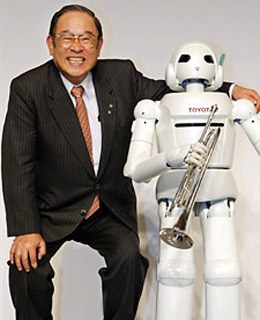
"The Machine That Changed the World," as a study at M.I.T. called it, isn't the telephone or even the automobile. It's the devastatingly efficient assembly-line method called the Toyota Production System (TPS), which has revolutionized the way factories are run worldwide. With a combined 93 years at Toyota between them, few people have done more to perfect "the Toyota Way" than chairman Hiroshi Okuda, 71, and president Fujio Cho, 67, Toyota's first two CEOs not to hail from the company's founding Toyoda clan. Okuda and Cho have taught hundreds of companies the TPS secrets of eliminating waste, reducing defects and maximizing flow. "From the very beginning, Toyota learned much from other carmakers," says Cho. "Sharing what we have discovered since then is one way we can give something back."
Despite such magnanimity, Toyota is a tenacious competitor. After years of turbocharged growth, the company is running neck and neck with Ford to be the world's second largest automaker, after General Motors. But its leaders acknowledge that efficiency is not enough if Toyota's growth is to continue. "We need to continue innovating," says Okuda. That explains a campaign to shift the industry from its dependence on petroleum-based fuels. Despite widespread skepticism, Toyota pressed on with the Prius, the world's first mass-market petroleum-electric hybrid car. A hybrid SUV is scheduled for release this fall. "Any carmaker who says hybrid cars can't be profitable," Okuda muses, "I would tell them to start looking for a new line of work."
—With reporting by Michiko Toyama